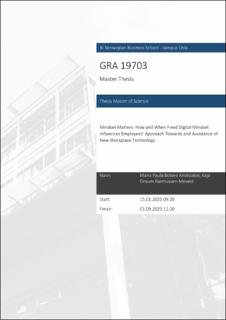| dc.contributor.author | Aristizabal, Maria Paula Botero | |
| dc.contributor.author | Rasmussen-Moseid, Kaja Onsum | |
| dc.date.accessioned | 2020-11-12T10:18:02Z | |
| dc.date.available | 2020-11-12T10:18:02Z | |
| dc.date.issued | 2020 | |
| dc.identifier.uri | https://hdl.handle.net/11250/2687548 | |
| dc.description | Masteroppgave(MSc) in Master of Science in Leadership and Organizational Psychology - Handelshøyskolen BI, 2020 | en_US |
| dc.description.abstract | The aim of the present study was to investigate whether having a fixed
digital mindset relates to employees' approach or avoidance towards new
workplace technology. We draw on the field of implicit theories and the job
crafting literature to explore technology acceptance in a novel manner. The study
used questionnaire data collected at two time points from 94 employees in a
Norwegian firm where a new technology was being implemented. The results of
our first model indicate that there is a relationship between fixed digital mindset
and the extent to which employees avoid technology, and this can be influenced
by perceptions of subjective norms. Concerning our second model, the
hypothesized moderated mediation relating fixed digital mindset to technology
approach was not supported. This indicated that training initiative frequency and
perceived usefulness did not mediate the relationship, even though digital selfefficacy
was found to partially moderate the relationship between having a fixed
digital mindset and training initiative frequency. These findings a | en_US |
| dc.language.iso | eng | en_US |
| dc.publisher | Handelshøyskolen BI | en_US |
| dc.subject | ledelse | en_US |
| dc.subject | organisasjonspsykologi | en_US |
| dc.subject | leadership | en_US |
| dc.subject | organizational psychology | en_US |
| dc.title | Mindset Matters: How and When Fixed Digital Mindset Influences Employees’ Approach Towards and Avoidance of New Workplace Technology Navn: | en_US |
| dc.type | Master thesis | en_US |
